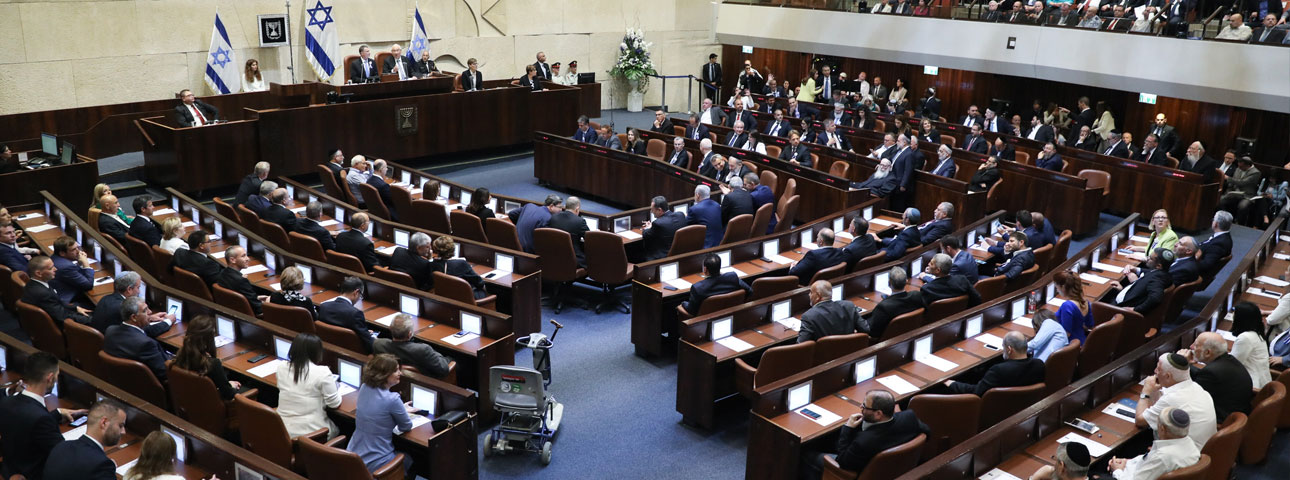The State of the Highly Personalized Israeli Democracy
At this writing, Israel seems to be headed towards its third elections within a year. Both Prime Minister Netanyahu and his main rival – Benny Gantz – failed in their attempts to recruit the necessary majority to establish a government. As a result, Israel has been governed for almost a year by a caretaker government, and no one can be sure that the next elections will resolve the stalemate. While this state of affairs may fulfill the dreams of libertarians or anarchists, for most others – it looks more like a nightmare.

Knesset
Let’s start with the good news: Israel is still a democracy. It adheres to the existing rules on how the Prime Minister is elected and the government is formed, and especially significant these days—on what happens if a government is not formed. Moreover, while us political scientists (or at least I…), expected voters to suffer from” voter fatigue,” which would lead to a decline in voter turnout in the second elections of September 2019, we actually witnessed an increase in participation. Furthermore, for the first time since 1996, in both the 2019 elections – the combined number of seats of the two large parties reached more than 50% of the total seats in the Knesset. .
The bad news is the stalemate. Israelis observing the political game are likely to think that there are better ways to decide who runs the country, than by holding elections. Even worse, the political elite may think that such dangerous ideas may be appealing to many people. At the moment, the game is still being played by the rules, though with a lot of negative propaganda, especially towards the Arab-Israeli minority.
What is the origin of this stalemate – the first ever in Israeli history? My first reaction – after witnessing the members of parliament who were just elected, voting to dissolve the Knesset and give up their seats after the April 2019 elections – was that there are no longer any rules in politics. If we cannot assume that politicians seek power, how can we explain politics?
The stalemate is a result of a power play. It is first of all, a game being played between the pro-Netanyahu camp – within his own party – the Likud-- and all of the (Jewish) religious parties against the anti-Netanyahu camp, made up of all the other parties except for Yisrael Betenu (with Avigdor Liberman at the helm). And finally Liberman, who for almost two decades, was perceived as a natural member of the right-religious coalition, has re-invented himself and set a new trend. He has rebranded his party as Hawkish on matters of security, and liberal on matters of religion and state, thus appealing to the median voter. Using this power he is pushing for the two largest parties in the pro and anti-Netanyahu camps to join together and form a “unity government.” His unique position as the current kingmaker means that he can allocate “his” seats to either camp—giving them a majority. The current stalemate is the result of both his refusal to compromise with one of these camps and the large parties from the pro and anti-Netanyahu camps to compromise with each other.
The name of the game is personalized politics. It isn’t only about saying yes or no to Netanyahu, who is currently under public indictment and facing charges of corruption. It is also about the current trend in Israeli politics – the development and success of “leader parties” – parties whose power is based on their leaders’ charisma and public appeal. All successful new, and relatively new, parties are “leader parties.” These include Yair Lapid’s Yesh Atid party, and the two factions that are its allies in the “Blue and White” anti-Netanyahu party alliance, headed by former military chiefs of staff. And Likud and Netanyahu, their rivals, are no different these days. To these, we may add smaller parties that are all about their leaders – parties that are thriving like mushrooms after rain.
So maybe the rules of politics are now more similar to the rules of the personalized politics of queens and the kings in the old days, yet still fit within the democratic framework. The parties and the party system take a back seat to the leaders and to their personal priorities and interests. There are allegations and even concrete evidence indicating that the prime minister’s family members are deeply involved in these personalized politics, and influence the rise and fall of specific politicians. And there are those who claim that no compromise agreement can be reached between the two large parties, because Blue and White leaders do not trust Netanyahu to stand by his word and rotate with Gantz in serving as Prime Minister.
These personalized politics are presented as such by the mass media, played as such by the politicians, and increasingly perceived as such by the voters. In the long run, this poses a threat to Israeli democracy. This is so because democracy is, after all, the rule of laws and institutions, not of any single individual. Israel isn’t the only country experiencing the personalization of politics. This is a much broader trend. That being said, a comparison among 26 democracies which I conducted with my colleague, Dr. Ofer Kenig, demonstrates that Israel and Italy are the champions of political personalization. From this perspective, the current stalemate is a symptom, and perhaps maybe a red light, for Israel. But not only for Israel: It is also a red light for other countries in which politics are personalized. If we do not want politics to resemble the Game of Thrones or the House of Cards, we should seriously consider how to push the personalization genie back into the institutional bottle.
